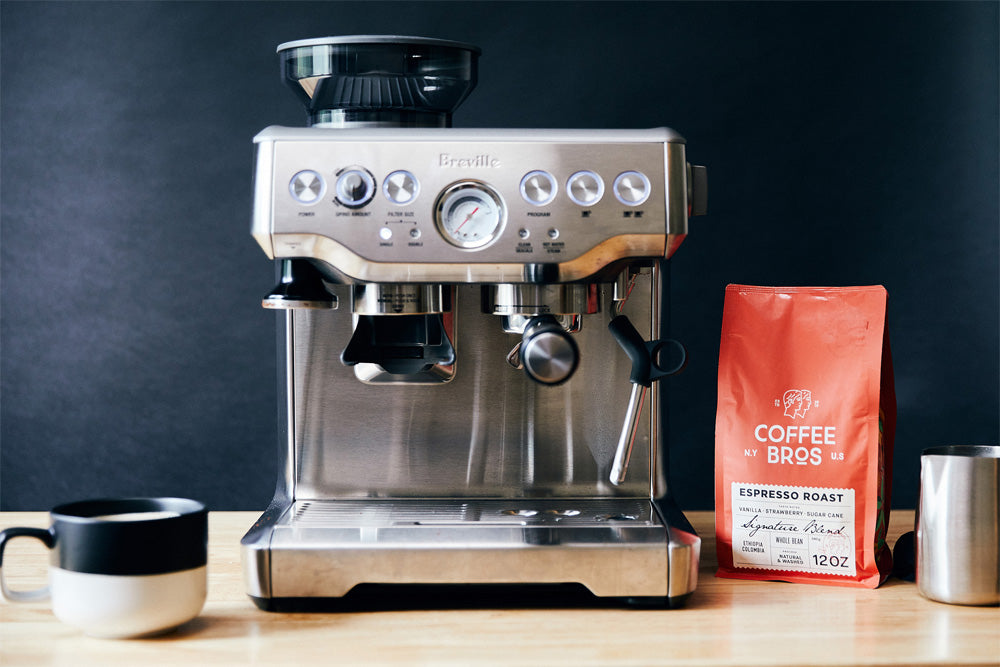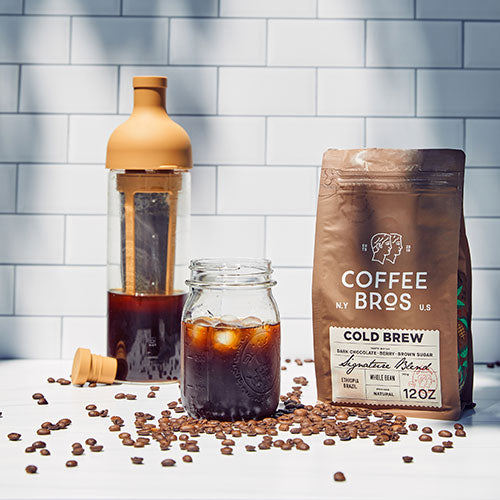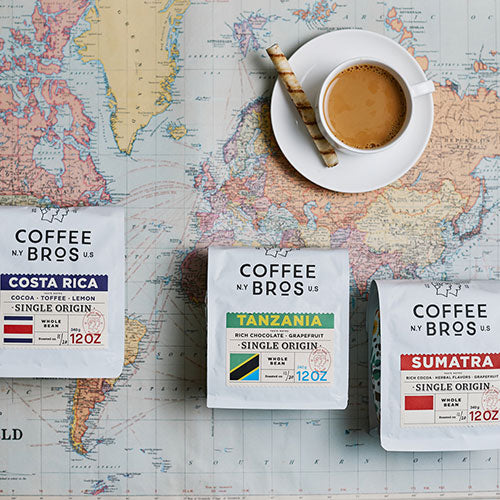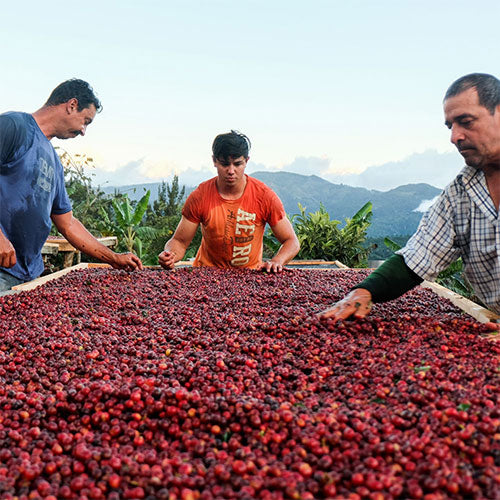November 5th, 2022
7 Tips For Picking The Best Coffee Beans For Espresso
Coffee technology has drastically improved since the first espresso machine was patented in 1884 by Angelo Moriondo. And, while it's never been a better time to brew from home, choosing the right coffee beans for espresso has never been more confusing.
An internet search yields hundreds of options: Bold? Fruity? Fairtrade? Keto? None of these words on the label guarantees the coffee will taste great, let alone be fresh or roasted, particularly for espresso.
As you may have guessed, getting the right coffee beans is the most critical part of making great espresso. A fancy machine cannot fix bad beans.
We'll show you exactly how to choose the best espresso beans for your unique tastes and preferences so that you can be confident with every shot!
Coffee Subscription Deal
Subscribe to Coffee Bros. coffee for 25% off when using code "FTSUB25" at checkout
Recommended Reading: Are you looking for the best espresso beans. Read our article on The Best Espresso Coffee in 2023.
What Are Espresso Beans, Exactly?
"Espresso beans" are simply coffee beans to brew an espresso drink! Coffee beans can be selected and roasted to create a particular flavor, as you'll discover, but espresso is just a method of coffee preparation. Espresso is the thing in the cup at the end of the brewing process; all you need is an espresso machine and roasted coffee beans.
All coffee beans can be made espresso-style, and an "espresso blend" or "espresso beans" can also brew a regular cup of coffee.
But sometimes, espresso blends taste terrible and here's why:
Traditionally, espresso blends are roasted super dark, which leads to unpleasant char and ash flavors. For decades, people have assumed it's "just how it is" and that the harsh bitterness is what makes an espresso an espresso.
It doesn't have to be this way! You don't have to settle for bitter espresso.
Espresso can be rich with subtle and complex flavors. Fruity and floral aromas, fascinating spice and pine notes, pleasant citrus acidity—we'll show you how to find the best espresso coffee beans so you can leave behind bitter coffee forever.
Which Coffee Beans Are Best for Espresso?
Coffee is a diverse fruit with over 120 species, each with unique traits and cup quality. Just like you might prefer particular apples (granny smith has nothing on that juicy honeycrisp!), you might gravitate toward coffees from specific countries, regions, or varietals.
On top of that, certain apples make better pies. A better-tasting "anything" comes down to many things (including preference), but the chemical composition of the apple or coffee's composition plays a big part. Coffee is similar-- certain coffees contain more sugars than others, which causes them to brew and taste differently.
Tip: Love a coffee at a local coffee shop? Ask the barista the origin of your favorite coffee. They'll happily help you figure out what kinds of coffee you like.
Making espresso is not forgiving (read our myth-busting article "What is Espresso"). For this reason, super delicate single-origin coffees that change a lot as they age are not our top suggestion (unless you crave a challenge).
How Fresh Do Beans Need to Be?
Nothing beats freshly roasted beans. Espresso is best when beans are between 7-21 days off roast. Why? Crema.
Crema is the creamy-looking top layer of an espresso. Crema's CO2 microbubbles, a product of the brewing process when hot water hits fresh coffee, is what we are all chasing. Crema can be mixed into the espresso shot to give an extraordinary depth of flavor.
Without crema, the espresso tastes kind of like really strong black coffee. As coffee ages, it loses CO2 and produces less crema. If you go through the process of buying super-fresh coffee, be sure to use it while it's fresh!
Also Read: Yes, You Can Freeze Coffee Beans (If You Follow This Trick)
What's the Best Roast Style for Espresso?
Remember: you can make espresso with any coffee (single origin, medium roast, light roast, or dark roast). "Espresso beans" and "espresso blend" mean the roaster has created the blend specifically with espresso brewing in mind.
We suggest medium to darker roasted coffees for espresso because they taste the most consistent.
There are two reasons for this:
-
Medium to darker coffees are more forgiving than lighter coffee. Lighter roast coffees can sometimes be too bright and acidic for some as a straight espresso shot. Light-roasted coffee can also get easily lost in milk, leaving you with little coffee taste in your milk-based beverages.
- Darker coffees pair better with milk. Deeper notes, like chocolate, caramel, and nuts, tend to go well with milk (lattes, cappuccinos, etc.). And when we add a hint of floral or fruity flavor, it all comes together harmoniously.
For example, our Espresso Roast is on the medium-dark end with smooth sugar, vanilla, and a hint of strawberry zing. It's the perfect blend of classic and inspiring.
On the other hand, our Dark Roast has bold and rich chocolate, caramel and maple notes and works exceptionally well in milk-based espresso drinks.
Do You Prefer Adventurous Flavor or Consistency?
Ask yourself: how much time am I willing to put into making this espresso taste good? Do I need it to taste the same every day?
Most people are creatures of habit when it comes to espresso. We often want something familiar with that classic dark roast taste but with a little more flavor.
We formulated our year-round espresso blend for balance and consistency. You won't have to spend much time fussing with the recipe or fall in love with a coffee only to have it disappear from the shelves at the end of the season.
But, if you like to nerd out and challenge your espresso-making ability, you may be looking for something small-batch and ultra-limited edition with funky, fruity flavors. These coffees inspire, challenge, and reward those who take the time to brew them correctly.
A small-batch, single-origin coffee is the 'adventure mode' of espresso.
Pick a Roaster That Shares Your Values:
Espresso drinkers tend to have discerning tastes, and if you're reading this article, it's because you wanted the best. And while there are plenty of excellent coffee beans to choose from, excellence is in the details.
Great espresso begins long before brewed: Are farmers and workers paid fairly? Are the beans roasted with care and intention? What are the beans shipped in? Does the company care enough to ensure freshness at every step? These questions feed the conscience as well as the coffee craving.




